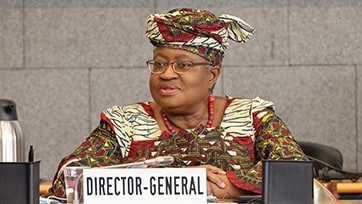Directora General Okonjo-Iweala: “No es momento de retroceder”

El comercio puede ayudar a los Miembros de la OMC a adaptarse y superar las conmociones de acontecimientos tales como la pandemia de COVID-19 y la crisis en Ucrania, dijo la Directora General de la OMC Ngozi Okonjo-Iweala el 28 de marzo. En su intervención en una reunión informal del Consejo General, la Directora General también pidió una acción coordinada para hacer frente al reciente aumento pronunciado de los precios de los productos básicos, que amenaza a la seguridad alimentaria de muchos países.
(de momento sólo en inglés)
«Trade has been and will remain a critical means of adaptation to the mounting global shocks that the world is currently experiencing,» the DG declared. «This is not the time to retreat inward … This is the time to stress the importance of multilateralism, global solidarity and cooperation.»
The COVID-19 crisis and the war in Ukraine have raised concerns about the vulnerability of global supply chains and led to calls in some quarters to re-locate production and sourcing locally in order to ensure stable supplies of critical goods and staples. The Director-General however underlined that supply resilience «will ultimately be best served by deeper and more diverse international markets.»
«Concentrating sourcing and production at home, while understandable, could also create new vulnerabilities and may not be the best risk management strategy,» she argued. «A region’s wheat crop could be destroyed by drought, flooding, or other weather-based phenomena. A harsh winter and an earthquake could knock out electricity and factory production.»
The war in Ukraine has caused immense human suffering and loss of life and unleashed an ongoing humanitarian crisis, the Director-General noted. It has also dealt a severe blow to the global economy still recovering from the impacts of the pandemic and has raised the spectre of food shortages in countries dependent on Ukraine and Russia for imports of key staples like wheat. Already in Africa, prices of key commodities have risen by 20-50% between January and March.
«For dozens of poor countries and tens of millions of people, basic food security is in danger,» she warned. «These countries already have been some of the slowest economic recoveries from the pandemic, and international cooperation on trade is necessary to help mitigate risks of poverty, hunger, even famine and social unrest.»
The Director-General noted that the UN Secretary-General has set up a three-tiered steering committee involving heads of government, heads of international organizations and technical experts to deal with the issue of surging energy and food prices.
The WTO is also expected to play a key role in finding solutions to the food crisis, the Director-General noted. The chair of the WTO’s agriculture negotiations, Ambassador Gloria Abraham Peralta of Costa Rica, is planning a food security conference that will take place at the end of April. WTO Secretariat staff have also been carrying out analysis on food security issues which will be shared with members shortly.
«We at the WTO have a solid basis on which to consider workable solutions to the present crisis,» the DG declared.
In the near-term, international cooperation on trade will be needed to minimize the impact of supply crunches for key commodities where prices are already high by historical standards and to keep markets functioning smoothly, the Director-General said. While only 12 members have imposed export restrictions on food to date, coordinated government action is needed to avoid a repeat of the cascading export restrictions that exacerbated the rise of food prices in the crisis of 2008-2010.
In addition, countries with buffer stocks that can afford to share could coordinate the release of wheat, barley, other cereals and grains and oils into international markets, thereby alleviating the supply squeeze. Countries such as the United States, Canada, Australia, Argentina, and France could increase wheat cultivation while others such as China, Germany, Morocco, Saudi Arabia, Egypt, and Nigeria could increase global supply of fertilizer. Africa, with plentiful land and other resources, can also take steps to produce more food itself by using more adaptable varieties of wheat, maize and other crops.
Trade facilitation measures could also be brought into play to ease the free flow of goods, while efforts should be made to allow the UN’s World Food Programme full access to humanitarian purchases. Prompt notification and information sharing regarding food supplies and stockpiles can help the international community better manage the situation and keep markets functioning more smoothly.
Several members took the floor after the Director-General’s intervention to indicate support for the suggestions outlined by her.
Chair report on MC12 consultations
Prior to the Director-General’s statement, the chair of the General Council, Ambassador Didier Chambovey of Switzerland, provide a readout on his recent consultations with members on substantive and administrative aspects related to the WTO’s 12th Ministerial Conference (MC12). The consultations took place over the first half of March and involved 42 delegations, including 12 group coordinators and one member group.
On the exact dates for the WTO’s postponed 12th Ministerial Conference (MC12), the chair said the emerging understanding is that the conference will take place from 12 to 15 June, with the meeting taking place entirely at WTO headquarters. The chair suggested that members proceed with this working assumption and precise dates in mind. He noted the desire of members that MC12 be a streamlined, business-like conference.
WTO members agreed on 23 February that MC12 would take place during the week of 13 June in Geneva following the easing of COVID-19 pandemic restrictions in the host country Switzerland. MC12 was due to take place from 30 November to 3 December 2021 but was postponed due to the outbreak of the Omicron variant of COVID-19.














